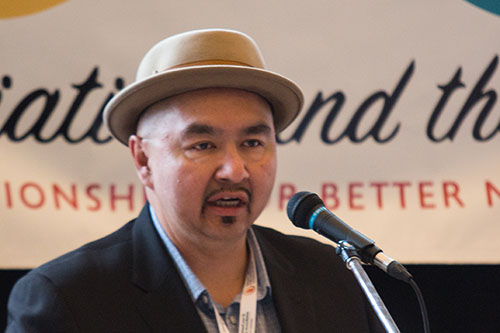For the last 20 years, John Lagimodiere has been working to unite Indigenous and non-Indigenous people.
Among his many jobs, Lagimodiere is the president and owner of Aboriginal Consulting Services and the editor-publisher of Eagle Feather News. He's the host of CBC’s radio special As If and an occasional host on CBC’s The Current. He also served on the Employment Insurance Board and the district council of Affinity Credit Union.
Lagimodiere has been recognized along the way. He received the Saskatchewan Centennial Medal and honoured with a Living in Harmony Award from the city of Saskatoon in 2006, and an ABEX award for Aboriginal Business in 2008.
Lagimodiere also earned a degree in sociology from the University of Saskatchewan with a focus on Aboriginal history and issues.
He’s a jack of all trades, but his main focus is the Indigenous awareness seminars he facilitates, with his unique brand of humour, to educate and connect various organizations with Indigenous and Métis communities.
Since 1998, he has facilitated seminars for organizations such as SaskTel, Cameco, Saskatoon Credit Union, PotashCorp, Saskatoon Police Service, Indian and Northern Affairs Canada and the University of Saskatchewan. Over 10,000 people have attended Lagimodiere’s seminars and, by the sounds of it, very few have left disappointed.
“It’s basically giving Native Studies 110 to people who never had a chance to get Native Studies 110, and catching them up on what they should have been taught in high school,” said Lagimodiere “We fill in holes that the education system left because of improper curriculum.”
Lagimodiere said the seminars help people “understand where Aboriginal people fit in the fabric of Canada both culturally and legally.” His message: “We’re all in this together.”
According to Lagimodiere, the seminars also help remove feelings of animosity between Indigenous and non-Indigenous people by talking about what’s causing those feelings.
"We would have so much more progress in the Aboriginal community, and in Canada, if we stripped away the emotion, myths and resentment around Aboriginal issues, and talked about the history and facts and how we’re going to go ahead together,” he said.
“There’s all this resentment and bad feelings on both sides, so we try to fix that. Every class we do is an act of reconciliation,” said Lagimodiere.
Another main focus for Lagimodiere is Eagle Feather News, which also features his sense of humour. “Humour is a huge part of (Indigenous) culture, and he really instills that in his readers as well as those working for him,” said Jeanelle Mandes, the newly appointed editor of Eagle Feather News.
Mandes has been mentored by Lagimodiere since 2007. “He definitely has leadership skills. He can connect with his readers and he has really strong ties with communities in Saskatchewan,” said Mandes. “He is essential in telling Indigenous stories in Saskatchewan.”
Lagimodiere is quick to offer advice for journalists who report on Indigenous stories. He said it’s important to be persistent and get involved. He tells journalists they should “understand the community as you understand your own, then you can be a proper journalist telling Aboriginal stories.” He also emphasizes the importance of getting the facts right and listening to both sides of the story.
Mandes said Lagimodiere has given many opportunities to aspiring journalists. “(Lagimodiere) gives pre-journalism students a chance to build their portfolios,” said Mandes, “When you come to the School of Journalism you need a portfolio. Some places don’t give you that opportunity, but John does.”
Shannon Avison is program coordinator of Indian Communication Arts at First Nations University of Canada. “John has been working with my students since I met him in 1999,” said Avison “He is patient and will work hard with new writers, but he also makes them understand the importance of being professional--especially hitting deadlines.”
During his speech at the Reconciliation and the Media Conference, Lagimodiere said that encouraging and hiring Indigenous journalists will improve the quality of both Indigenous and non-Indigenous stories because the demographic in the newsroom will finally start to reflect the community. He said a balanced newsroom will help unify Indigenous and non-Indigenous people, which is an essential step in working towards reconciliation.















